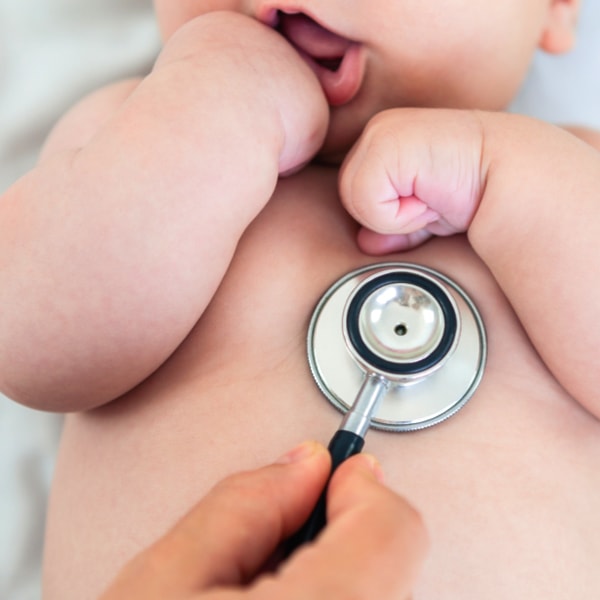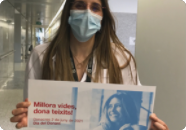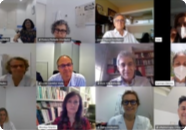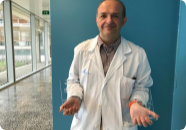- Home
- Citizenship
- Clinical specialties and services
- Hospital General de l'Hospitalet
- Pediatrics (Neonatology)
Hospital General de l'Hospitalet
Pediatrics (Neonatology)
- About the Observatory
- Team
- Units and benefits
- Diseases and procedures
- Research
- Teaching activity
- Related information

About the Observatory
The maternal and child area brings together Obstetrics and Neonatology services.
It has been providing assistance since 1971 to the entire population of Hospitalet de Llobregat and El Prat de Llobregat. The area has undergone notable structural and care changes in recent years, including the opening of the new Neonatology unit, and has been ranked among the best services of hospitals of its level. It currently attends around 1.500 births a year and offers individualized and personalized care where the patient and the family are at the center of the work. It guarantees quality in care processes and a practice based on scientific evidence.
The location on the same floor of the entire Pregnancy and Birth area allows any eventuality to be resolved very quickly without the need for transfers of the mother and the baby. This has allowed gains in functionality and efficiency to offer a better service.
The Neonatology area has an intermediate care unit with the capacity to care for up to 6 babies from 1.500 g and 32 weeks of gestation. It is equipped with 2 incubators, 2 thermal cradles, 1 transfer incubator, 3 phototherapy units, neonatal monitoring equipment for each admitted baby, 1 device to provide mechanical ventilation and 1 for continuous positive airway pressure (CPAP). . It also has 2 neonatal resuscitation points, 1 external consultation to carry out the follow-up of certain pathologies and 1 "lactary room" to provide specific and qualified support for breastfeeding. The basic care of the baby is carried out in the same room as the mother.
The unit is open to parents, grandparents and siblings with no restrictions on visiting hours.
-
Date of update 01.01.2024
Head of Service

-
Enrique Manuel Rodríguez Alhama
hgh pediatrics
Head of Service
-
Susana Ruiz García Diego
hgh pediatrics
specialist doctor
-
Daniel Porcar Farran
hgh pediatrics
specialist doctor
-
Alberto Batista Muñoz
hgh pediatrics
specialist doctor
In this section appear the professionals of the Integral Health Consortium who have authorized the display of their personal data.
-
Date of update 01.01.2024
Units and benefits
By processes:
- Unit 12. Admission of the baby to the mother's room, where all the care and checks proper to a healthy baby are carried out.
- Neonatal unit. Given the care profile of the unit, the most frequent assumed pathologies are:
- Suspected infection with clinical stability
- Mild-moderate respiratory distress that does not require invasive ventilation
- Jaundice that does not require blood transfusion
- Moderate prematurity (>32 weeks of gestation) and weight (>1.500 g)
- Intrauterine growth retardation
We have an external consultation for the control and follow-up of certain pathologies of babies at risk, the follow-up of early discharge, the delivery of pending results at discharge, as well as support for breastfeeding.
Potential neonatal emergencies are attended to (in the first week of life).
The center does not have pediatric emergencies. Those who can eventually be treated will be referred to the basic health area (ABS) or to the reference acute hospital as appropriate.
-
Date of update 01.01.2024
Diseases and procedures
-
The portfolio of services for acceptable pathologies are:
- Babies with infection risk factors: clinical and/or analytical control.
- Children of pregestational or gestational insulin-treated diabetic mothers: glycemic controls and other possible complications.
- Paraphysiological polyglobulia: treatment and control of possible complications.
- Moderate premature babies (gestational age between 32 – 36,6 weeks).
- hypoglycemia
- Prenatal diagnoses or antecedents that require monitoring and/or complementary examinations during hospital admission.
- Risk of vertically transmitted infections (HIV, HBsAg, VHC, lues, Chagas).
- Jaundice requiring simple phototherapy.
- Re-entry of the baby by maternal re-entry when the mother can take care of the baby.
- Children of mothers without gestational control / sociopathies.
- Asymptomatic fetal acidosis or with mild encephalopathy.
-
Date of update 01.01.2024
Research
In 2022 we have been accredited to participate as collaborators in a research study: "Evaluation of the impact of the type of probiotic, type of birth and type of breastfeeding in newborns after dysbiotic birth on the evolution of the intestinal microbiota".
-
Date of update 01.01.2024
Teaching
- Degree training: training of Nursing students.
- Continuous external/internal training: two courses accredited by the Spanish Society of Neonatology (SENeo) in complete neonatal cardiopulmonary resuscitation (1 intended for LLIR training and 1 intended for retraining of care staff in the maternal and child area: nurses and midwives).
- Participation in the program of sessions in the maternal-child area with MIR training and medical and nursing students.
-
Date of update 01.01.2024








